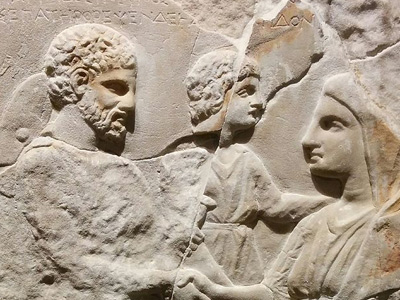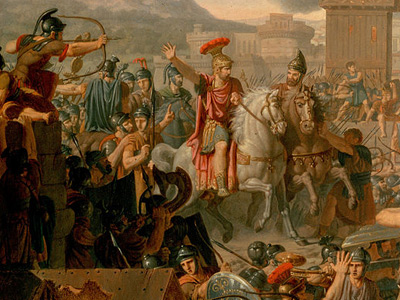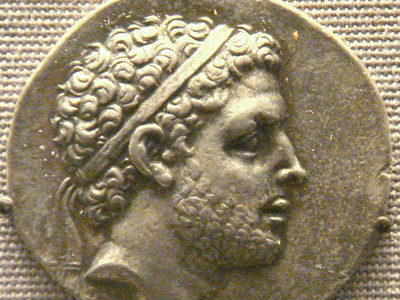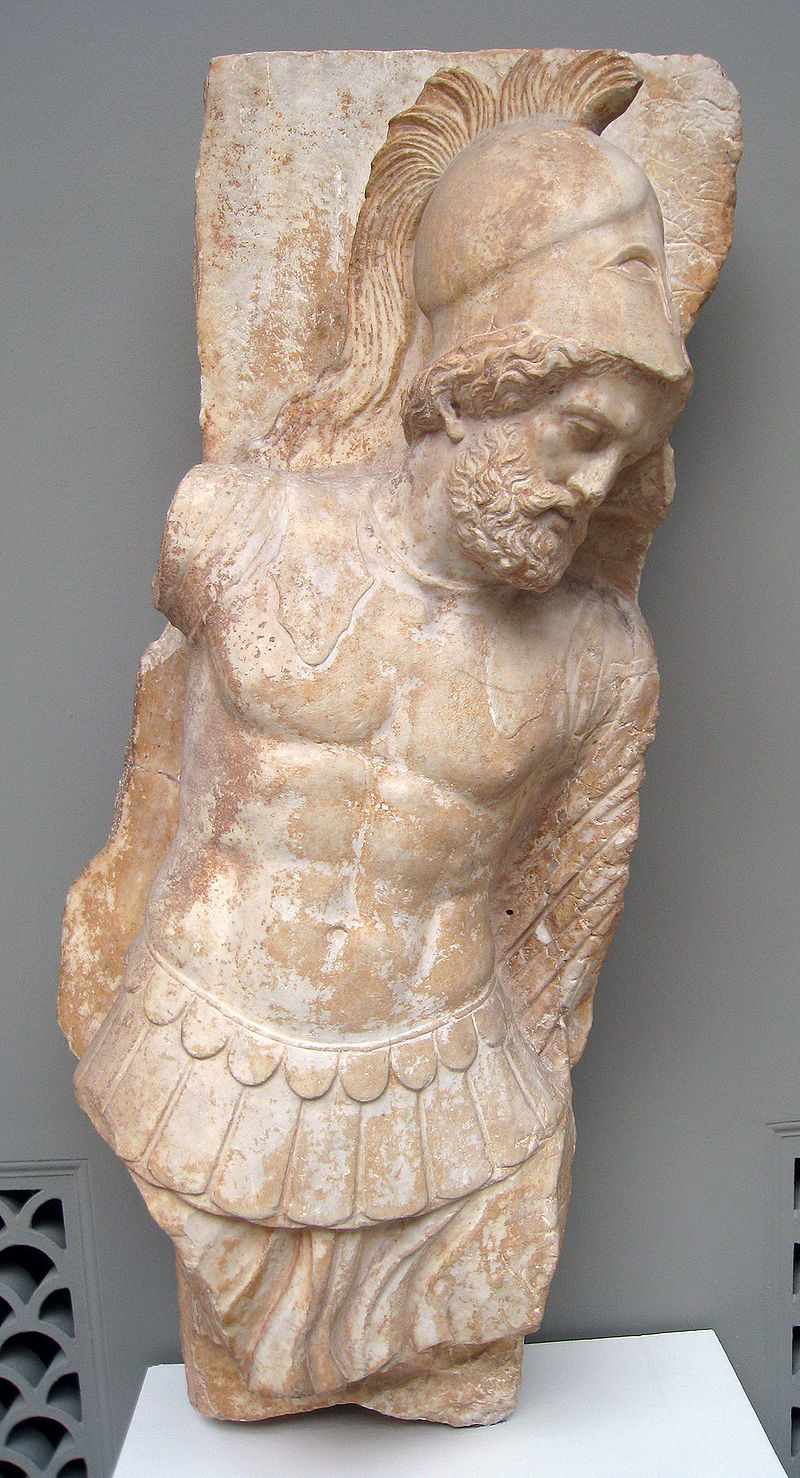Third Macedonian War (171–168 BC)
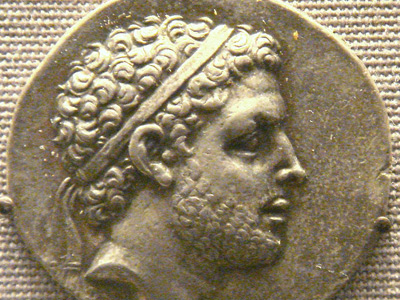
Background
In 179 BC King Philip V of Macedon died and his ambitious son, Perseus, succeed to the throne. In pursuit of an alliance, Perseus married Laodike, the daughter of Seleucus IV the king of the Seleucid Empire. Prusias II of Bithynia (in modern north-western Turkey), who was an enemy of Eumenes II of Pergamon (in modern western Turkey), an ally of Rome, asked Perseus to marry his daughter to him. Abrupolis, the king of the Thracian tribe of the Sapaei and an ally of the Romans The Roman Republic was a form of government of Rome and the era of the classical Roman civilization when it was run through public representation of the Roman people. Beginning with the overthrow of the Roman Kingdom (traditionally dated to 509 BC) and ending in 27 BC with the establishment of the Roman Empire, Rome's control rapidly expanded during this period - from the city's immediate surroundings to hegemony over the entire Mediterranean world. attacked Macedon, laid it waste as far as Amphipolis, and overran the gold mines of Mount Pangaeus. He was repulsed and then driven out of his territories by Perseus. This conflict contributed to the tensions which led to the Third Macedonian War, because Rome took issue with the ousting of its ally. Perseus made an alliance with Cotys IV, the king of the Odrysian kingdom, the largest state in Thrace. He increased the size of his army. He also announced that he could carry out reforms in Greece and restore its previous strength and prosperity. Perseus sent agents to endeavour to gain support in the Greek states and in the Greek cities. He gained the support of Greeks who were treated generously, saw Perseus as their kindred, were keen on revolutionary change, or did not want to be at the mercy of Rome. Perseus' propaganda and political manoeuvres around Greece created significant political divisions within the Greek states and cities, which became caught up in bitter disputes between pro-Roman and pro-Perseus factions.
The Roman Republic was a form of government of Rome and the era of the classical Roman civilization when it was run through public representation of the Roman people. Beginning with the overthrow of the Roman Kingdom (traditionally dated to 509 BC) and ending in 27 BC with the establishment of the Roman Empire, Rome's control rapidly expanded during this period - from the city's immediate surroundings to hegemony over the entire Mediterranean world. attacked Macedon, laid it waste as far as Amphipolis, and overran the gold mines of Mount Pangaeus. He was repulsed and then driven out of his territories by Perseus. This conflict contributed to the tensions which led to the Third Macedonian War, because Rome took issue with the ousting of its ally. Perseus made an alliance with Cotys IV, the king of the Odrysian kingdom, the largest state in Thrace. He increased the size of his army. He also announced that he could carry out reforms in Greece and restore its previous strength and prosperity. Perseus sent agents to endeavour to gain support in the Greek states and in the Greek cities. He gained the support of Greeks who were treated generously, saw Perseus as their kindred, were keen on revolutionary change, or did not want to be at the mercy of Rome. Perseus' propaganda and political manoeuvres around Greece created significant political divisions within the Greek states and cities, which became caught up in bitter disputes between pro-Roman and pro-Perseus factions.
At the beginning of 173 BC the Romans sent commissioners to Aetolia and Macedonia, but they were not given the opportunity to meet Perseus. The Romans felt that it was clear that he was making preparations for war and that it would not be long before he would take up arms. In the Aetolian cities there were increasingly violent internal conflicts and the leaders of the pro-Roman and pro-Perseus factions refused to keep this in check. A Roman envoy attended the session of the Aetolian council at Delphi. He asked both quarrelling factions to abstain from war. This was agreed through an exchange of hostages who were sent to Corinth. The envoy then went to the Peloponnese and called a meeting of the Achaean council. He praised the Achaeans for retaining an old decree forbidding the Macedonian kings any approach to their territories, and clarified that Rome considered Perseus an enemy. There was also violent conflict in Thessaly and Perrhaebia (the land of the Perrhaebi, a tribe in northern Thessaly). This was exacerbated by a problem with indebtedness. Rome sent an envoy to try to defuse the situation. He managed to do so by addressing the serious problem of indebtedness "swollen by illegal interest" in both areas.
Eumenes II of Pergamon, whose kingdom was an old ally of Rome and had been in conflict with Macedon and who disliked Perseus, made a speech in the senate in Rome with the aim of precipitating hostilities. The contents of the speech were kept secret and were leaked only after the end of the war. He claimed that Perseus had been fostering war since the day of his accession. He was respected and feared in the east and had influence on many kings. He mentioned Prusias of Bithynia, who was an enemy of Pergamon, asking for the hand of Perseus’ daughter. He also mentioned that Antiochus IV, the new Seleucid king, betrothed his daughter to Perseus as an example of Perseus gaining influence among kings in the east, even though Antiochus had just renewed an alliance with Rome which was made by his father. The Boeotians, had never made an alliance with Macedon, but now they were in a league with Perseus. Members of the Achaean council threatened to call on Rome in their opposition to an alliance with Perseus. Had it not been for this, such an alliance might have gone through. Perseus made preparations for war, storing corn for 30,000 troops. He had money to hire 10,000 mercenaries and could draw many soldiers from Thrace. He had been stocking weapons. He seized some places and persuaded others through favour. Eumenes II claimed that if Rome ignored these developments, Perseus might attack Italy.
A few days after Eumenes' speech the senate received envoys from Perseus. They said that Perseus had not said or done anything hostile. However, the senators did not believe this and "their ears had been captured by Eumenes". They felt affronted when the leader of the embassy said that if Perseus saw that the Romans were bent on an excuse for war, he would response with courage and that " the chances of war were the same for both sides and the issue was uncertain." When they returned to Macedon they told Perseus that the Romans were not preparing for war, but they were so embittered with him that they might do so soon. Perseus thought that this might be possible. He was determined to begin the war by shedding the blood of Eumenes, whom he hated, and called for Euander, a leader of Cretan mercenaries, and three Macedonian killers to arrange the assassination of Eumenes.
The cities of Greece and Asia (western and central Turkey) were concerned about the events of Eumenes's speech and the envoys of Perseus. They thought that Eumenes was steering Rome towards war. They sent embassies to Rome. One of them was from Rhodes. It said that they felt sure that Eumenes had included Rhodes among those he accused of being friends of Perseus and, therefore, Rhodes had tried to confront Eumenes in the Roman senate. As this had failed, they accused Eumenes of trying to stir the Lycians (a people in western Turkey who were under Eumenes' rule) against Rhodes and claimed that he was more oppressive in Asia that the Seleucid king had been. The senators resented this claim. Hostility towards Eumenes by various Greek states made Rome more determined to show favour to him.
The assassination of Eumenes arranged by Perseus occurred when he went to Delphi. It failed. Gaius Valerius Valerius, who had been sent to investigate the situation in Greece and monitor Perseus, returned to Rome and agreed with the allegations Eumenes had brought to the senate. He also bought woman who was involved in the failed plot against Eumenes in Delphi and a Roman who claimed that Perseus had tried to coerce him into poisoning ambassadors to Rome he wanted to kill. This intensified old enmities and led to Perseus being declared a public enemy, the decision to wage war and the sending of an army to Apollonia on the western coast of Greece, and occupy the coastal cities. The was put off for the year. Eumenes also prepared for war.
Gentius, king of the Illyrians, had brought himself under suspicion, but had not gone so far as to decide for certain which side he should support. The Thracian Cotys IV, king of the Odrysian Kingdom, the largest state in Thrace, had already declared for Macedon.
HISTORY
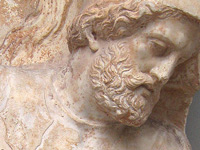
RESOURCES
This article uses material from the Wikipedia article "Third Macedonian War (171–168 BC)", which is released under the Creative Commons Attribution-Share-Alike License 3.0.
© Stories Preschool. All Rights Reserved.

